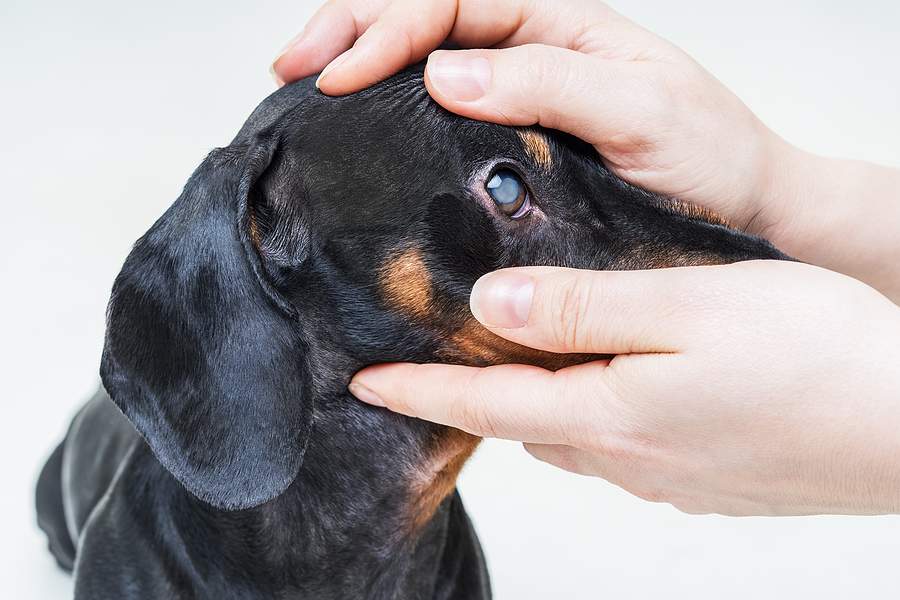Unfortunately, our pets don’t live as long as we do, and as they age a lot of changes occur. However, advances in veterinary care mean our animal companions are with us longer, and we need to help them through the aging process. Pet aging involves changes that you might be noticing or can expect to develop, and these are discussed below.
Vision Changes
- Nuclear/Lenticular Sclerosis. Hardening of the eye lens causes cloudiness. This change doesn’t significantly interfere with vision apart from clearly seeing objects up close.
- Cataracts. The lens becomes opaque, resulting in diminished vision and possibly blindness. Cataracts can be a symptom of diabetes mellitus.
What you can do: Don’t make major changes to your home’s layout. Add extra night lights near stairs. Supervise your aging pet near hazards. Check out this protective device for blind dogs.
- Iris Atrophy. The iris is a muscle, and with aging muscles can weaken and become smaller. Your pet’s eyes may become more light-sensitive.
What you can do: Avoid direct sunlight. Doggles (sunglasses for dogs) can be useful and adorable!)
- Retinal Changes. The retina contains cells that process light and send nerve impulses to the brain. The retina thins with pet aging, and loss of night vision can result.
Hearing Changes
- Hearing loss (presbycusis) is common in aging pets. Higher frequencies go first, and both ears are usually affected.
What you can do: Develop hand signals to communicate with your deaf pet.
Skin Changes
- Flaky, dry skin. Oils from sebaceous glands keep the skin and coat healthy. Pet aging means less oil production.
- Hair loss/shedding. Hair follicles atrophy resulting in abnormal shedding patterns or hair loss.
What you can do: Provide sun protection.
- Skin bumps/lumps. Common benign tumors may appear – sebaceous and cutaneous adenomas. A veterinarian should evaluate any skin changes.
- Odor. Pet aging can mean a slightly decreased immune function, leading to skin infections and unpleasant odors.
What you can do: Keep up with brushing and bathing – medicated shampoos may help. Use fatty acid supplements.
Mobility Changes
- Arthritis. Causes joint stiffness, pain, and lameness. Maintaining a healthy body weight is important. Medications to reduce pain and control inflammation can help.
- Muscle loss (sarcopenia). As muscle fibers are lost, older pets become thin and frail.
What you can do: Engage your pet in low-impact activity, physical therapy, or swimming. Install steps or ramps. Employ slings or harnesses for walking assistance, and booties for traction. Give your pet a senior-specific diet with extra protein.
Voice Changes
- Muffled or weak bark/meow. Usually this is a benign change, but it could be related to laryngeal paralysis, which might need medical intervention.
What you can do: Pets with laryngeal issues should be walked in a harness. If your pet has difficulty with temperature regulation, use fans for cooling.
Breathing Changes
- Any changes in breathing necessitate a vet visit. Pet aging can produce mild lung fibrosis.
What you can do: Make sure your pet maintains a healthy weight.
Behavioral Changes
- Canine Cognitive Dysfunction. Your aging dog may appear disoriented, confused, anxious, or forgetful.
What you can do: Don’t leave your pet unsupervised while outside or in an unfamiliar area. Provide mental stimulation, e.g., hide and seek, clicker training.
Urinary Tract and Bowel Changes
- Urinary incontinence. A weakened urinary sphincter is associated with pet aging. Changing hormone levels can also play a role. Medications may help.
- Fecal incontinence. The anal sphincter can also become weaker. Have your pet evaluated to eliminate intestinal parasites, arthritis caused pain during fecal elimination, or anal/rectal masses.
What you can do: Use raised and absorbent bedding. Try acupuncture, diapers, or other available products.
Pet Aging – When the Inevitable Happens
Midlands Pet Care in Lexington, SC, specializes in private and caring pet burials and cremations for your beloved pets. Please contact us for more information.

